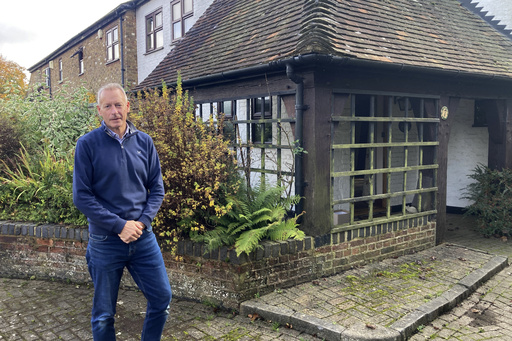
“`html
ABBOTS LANGLY, England — The Tithe Barn, an historical building originally constructed to store the harvest of local peasant farmers, has been repurposed into homes that honor its rich history. However, this peaceful community is currently rallying against a proposed development next door that symbolizes modern advancement.
Local authorities had previously rejected a plan to build a data center on a nearby field due to intense opposition from community members. Nevertheless, the proposal is being reconsidered by the government of British Prime Minister Keir Starmer, who is advocating for reforms aimed at stimulating economic growth following a July election victory for his Labour Party.
Residents of Abbots Langley, located 18 miles (30 kilometers) northwest of London, express concerns that the facility would overtax local resources, create excessive noise, and increase traffic, ultimately altering the tranquil atmosphere of their village, home to over 20,000 individuals. The village is notable for its historical charm, featuring a 12th-century stone church and a picturesque row of thatched cottages that were inspired by a farm built for French Queen Marie Antoinette.
Stewart Lewis, a 70-year-old resident in one of the refurbished homes of the 600-year-old Tithe Barn, vehemently opposes the plan, stating, “It’s just hideously inappropriate. Any sensible person would think twice about locating a data center in such a location.”
The surge in demand for cloud computing and data storage, driven by the rise of artificial intelligence, has ignited tensions between corporate interests, national directives, and local community matters. Britain’s Deputy Prime Minister Angela Rayner has intervened to assess appeals made by developers for multiple data center initiatives that were previously dismissed by local councils. Among these initiatives are the proposed facilities in Abbots Langley and two others in Buckinghamshire, just west of London, with a decision on the first appeal anticipated by January.
The contention surrounding these projects stems from their intended locations on “greenbelt” land, which is typically preserved to deter urban development. Rayner is advocating for the development of certain regions of greenbelt, arguing that much of it is of low quality. One of the projects suggested for Buckinghamshire includes the redevelopment of an industrial site adjacent to a busy highway.
According to Stephen Beard, the global head of data centers at Knight Frank, a property consultancy engaged in the site, “While it may be classified as greenbelt land, it doesn’t retain any of the green characteristics today. It’s actually an eyesore that is very visible from the M25 highway.”
Greystoke, the firm proposing the Abbots Langley data center and another in Buckinghamshire to be built on a former landfill site, has not responded to inquiries regarding the project. However, a company representative in an online presentation highlights their extensive search for suitable locations, describing the Abbots Langley site as the best option available, without specifying potential clients for the center.
The British government is positioning data centers as a pivotal aspect of its economic strategy, designating them as “critical national infrastructure” to instill investor confidence. A noteworthy agreement announced by Starmer includes a £10 billion (approximately $13 billion) investment from private equity firm Blackstone to establish Europe’s largest AI data center in northeastern England.
Currently, the land proposed for the Abbots Langley data center is used for grazing horses and is flanked on two sides by affordable housing and a highway. The plans to construct two sizable buildings totaling 84,000 square meters (approximately 904,000 square feet), reaching heights of up to 20 meters (66 feet), have raised alarms among Lewis and other locals, who fear the structures will overshadow their surroundings.
Many residents are skeptical of Greystoke’s claims that the facility could generate up to 260 jobs, with tech consultant Jennifer Stirrup noting, “Most jobs will likely be automated, meaning they won’t require a workforce.”
Despite the opposition, some villagers, like retiree Bryan Power, express support for the data center, viewing it as an opportunity for economic growth similar to the nearby Warner Bros. Studio Tour, which features a Harry Potter exhibition. “It’ll generate some jobs, which is a positive,” Power remarked. “If this doesn’t happen here, it’ll simply relocate elsewhere.”
Environmental impact remains a significant concern regarding data centers, particularly their extensive energy consumption. Greystoke reported that the facility would demand 96 megawatts of power; however, neighbor James Felstead, who directs a renewable energy company, argues that the local power grid is ill-equipped to support such increased demand. This challenge is reflective of a broader issue across Europe, where data center energy needs are expected to triple by the decade’s end, as noted by consulting firm McKinsey. While some major tech companies look to nuclear energy for sustainable solutions, increasing awareness of the environmental footprint of data centers is eliciting resistance globally.
In recent months, Google had to pause its $200 million plan for a data center in Santiago, Chile, due to community concerns regarding its water and energy consumption. In Ireland, a temporary halt on new data centers around Dublin was implemented until 2028 due to similar fears about excessive electricity usage. A large data center project in northern Virginia barely secured county approval last year amidst substantial resident pushback over environmental consequences. Various cities, including Frankfurt, Amsterdam, and Singapore, have imposed restrictions on data center developments.
As public understanding of the industry continues to grow, individuals like Sebastian Lehuede, a King’s College London lecturer specializing in ethics, AI, and society, note, “People are beginning to recognize that these data centers present significant challenges.” With rising awareness of their environmental effects, he anticipates a surge in local objections to similar projects in the future.
“`
